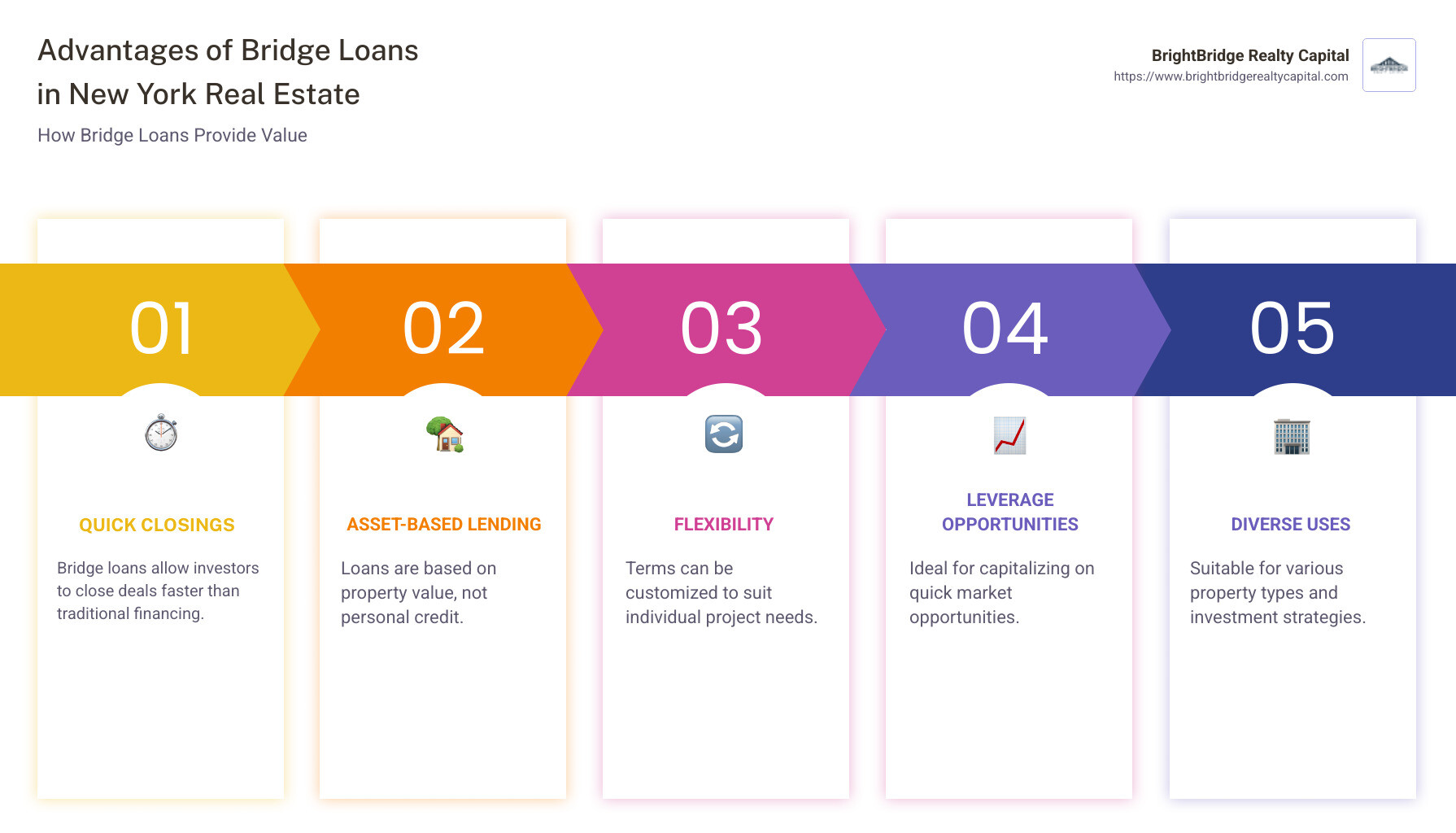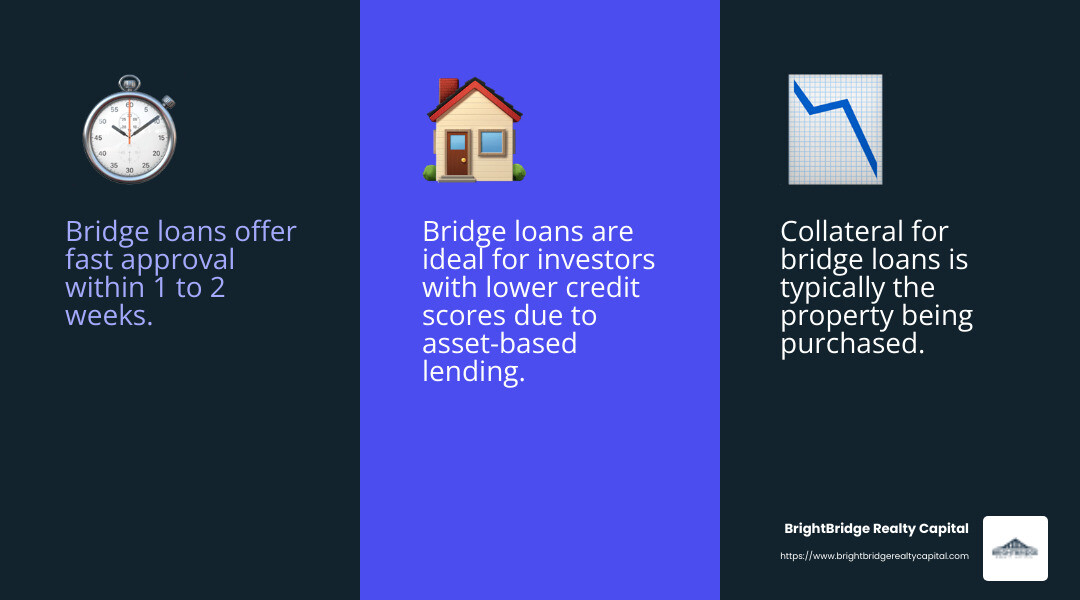Bridge Loans in the Big Apple: Your Guide to Real Estate Financing

New york real estate bridge loans are increasingly becoming the go-to solution for real estate investors who need quick and flexible financing. These short-term loans are designed to bridge the gap between acquiring a property and securing permanent financing or selling the property.
- Quick and flexible funding solutions
- Ideal for fix-and-flip projects or expanding rental portfolios
- Centered on the property's value rather than personal credit
In the busy real estate market of New York, where time is of the essence, bridge loans offer a competitive edge. They allow investors to secure properties swiftly without being bogged down by the lengthy approval processes typical with traditional bank loans.
Unlike conventional loans, which focus on personal credit history, bridge loans in New York primarily assess the value and potential of the property itself. This asset-based approach opens doors for many investors, even those with less-than-perfect credit, to capitalize on emerging market opportunities.
Whether you’re eyeing a lucrative fix-and-flip project in Brooklyn or planning to expand your portfolio with a multi-family unit in Manhattan, understanding how bridge loans work can be a game-changer.

Easy new york real estate bridge loans word list:
Understanding Bridge Loans
Bridge loans are a type of short-term financing that can provide immediate cash flow for real estate investors. These loans are designed to fill the gap between purchasing a property and securing long-term financing or completing a sale.
Unlike traditional loans, bridge loans are secured loans. This means they are backed by collateral, typically the property being purchased or another real estate asset. This security allows lenders to focus more on the property's value and potential rather than the borrower's credit score.
Key Features of Bridge Loans
Short-Term Nature: Bridge loans usually have terms ranging from 12 to 36 months. This short duration is ideal for investors who plan to quickly sell or refinance the property.
Immediate Cash Flow: With a faster underwriting process, bridge loans can be approved in as little as 1 to 2 weeks. This quick turnaround is crucial in competitive markets like New York, where opportunities can disappear fast.
Secured by Real Estate: The property itself acts as collateral, which often allows for more flexible lending criteria. This asset-based approach means that even borrowers with lower credit scores can qualify.

Bridge loans are particularly popular for fix-and-flip projects and other investments where time is of the essence. By focusing on the property's value, these loans offer a unique advantage in the New York real estate market.
New York Real Estate Bridge Loans
Benefits of Bridge Loans
Fast Funding
In the busy New York real estate market, speed is key. Bridge loans offer fast funding, often closing within a week. This quick access to cash allows investors to seize opportunities that might otherwise slip away.
Flexible Terms
Bridge loans come with flexible terms custom to the needs of the borrower. Whether you're looking for a short-term solution or need specific terms to match your investment strategy, these loans can be customized to fit your situation.
Competitive Rates
Despite their short-term nature, bridge loans offer competitive rates. Interest rates typically range from 8% to 11%, which is a fair trade-off for the speed and flexibility they provide.
Quick Closings
Unlike traditional bank loans that can take months to close, bridge loans can be finalized in just days. This quick closing process is vital for real estate investors who need to act fast in a competitive environment.
Asset-Based Lending
Bridge loans are asset-based, meaning they focus on the property's value rather than the borrower's credit score. This makes them accessible to a wider range of investors, including those with less-than-perfect credit.
Property-Focused
These loans are property-focused, allowing for funding on a variety of real estate types, from residential to commercial. This focus ensures that the property’s potential is a primary consideration in the lending decision.
How Bridge Loans Work
Underwriting Process
The underwriting process for bridge loans is streamlined and efficient. Lenders prioritize the property’s value and potential, which allows for faster approvals. This is particularly beneficial in New York real estate, where timing is everything.
Loan-to-Value (LTV)
The LTV ratio is a critical factor in bridge loans. Typically, the loan amount covers 70% to 85% of the property purchase price, ensuring that the loan does not exceed approximately 67% of the property’s After-Repair-Value (ARV).
Interest Rates
Interest rates for bridge loans are generally higher than traditional loans, reflecting their short-term nature and quick availability. Rates range from 8% to 11%, offering a balance between cost and the benefit of rapid access to funds.
By focusing on the property and offering flexible solutions, bridge loans provide New York investors with the tools they need to steer a dynamic market. This makes them an invaluable resource for those looking to capitalize on real estate opportunities with speed and confidence.
Types of Properties for Bridge Loans
Bridge loans are versatile tools in real estate financing, especially in a market like New York. They cater to a variety of property types, each with its own unique characteristics and investment opportunities.
Residential Properties
Single-Family Homes and Condominiums
Bridge loans are ideal for investors looking to purchase or renovate single-family homes and condos. These properties are often used for fix-and-flip projects, where quick funding and flexible terms are crucial. With bridge loans, investors can quickly acquire these properties, make necessary improvements, and sell them at a profit.
Co-ops
In New York, co-ops are a popular residential option. While traditional financing for co-ops can be complex, bridge loans offer a streamlined solution. They provide the necessary capital to secure a co-op unit quickly, allowing investors to take advantage of prime opportunities in the market.
Commercial and Industrial Properties
Multi-Family and Mixed-Use Buildings
Bridge loans are particularly beneficial for multi-family and mixed-use properties. These properties often require substantial renovations or repositioning to maximize their value. Bridge loans provide the capital needed to complete these projects, enabling investors to increase rental income and overall property value.
Retail and Office Buildings
For retail spaces and office buildings, bridge loans offer the flexibility to address immediate funding needs. Whether it's to cover a gap in financing or to capitalize on a time-sensitive opportunity, these loans ensure that investors can act swiftly. This is especially important in New York, where commercial real estate can be highly competitive.
Warehouses and Industrial Spaces
Warehouses and industrial properties are in high demand, particularly with the growth of e-commerce. Bridge loans can facilitate the acquisition or renovation of these spaces, providing the funds necessary to improve functionality and appeal to potential tenants.
By accommodating a wide range of property types, bridge loans empower investors to leverage opportunities across both residential and commercial sectors. This flexibility is essential for navigating the diverse and dynamic landscape of New York real estate.
Frequently Asked Questions about Bridge Loans
What are bridge loans used for?
Bridge loans are a versatile tool in real estate financing, especially in the busy market of New York. Fix-and-flip projects often rely on bridge loans to swiftly acquire and renovate properties, aiming for a quick sale at a profit. These loans provide the immediate cash flow necessary to purchase and improve properties that traditional banks might not touch due to their condition.
Refinancing is another common use. When a traditional mortgage is about to mature, a bridge loan can prevent default by providing temporary financing while securing permanent refinancing. This is crucial in a fast-moving market where time is of the essence.
For those looking to tap into the equity of a property, cash-out loans offer a quick solution. Bridge loans allow investors to refinance an existing loan at higher leverage or even perform a complete cash-out on properties owned free and clear. The speed of bridge loans—often closing within 1-2 weeks—makes them ideal for time-sensitive situations.
How do bridge loan lenders work?
Bridge loan lenders prioritize the property over the borrower's financial history, making them distinct from traditional lenders. The process involves a property evaluation to determine its potential post-repair value (ARV). This focus on the asset allows for quick funding, often within weeks, compared to the months-long approval process of conventional loans.
Lenders offer flexible criteria, catering to properties that may need significant rehab or have existing issues like code violations or missing certificates of occupancy. These loans are accessible even to those with lower credit scores, provided the property itself holds promise.
What do bridge loan lenders look for?
To qualify for a bridge loan, borrowers must operate under an LLC, as these loans are considered commercial transactions. This structure shields personal assets and aligns with the business-focused nature of bridge loans.
A thorough property appraisal is conducted to ensure the purchase price and ARV are reasonable. Lenders look for potential instant equity if the property is bought below market value, adding an extra cushion for the borrower.
Lastly, a clean title is essential. Any liens or disputes must be resolved to secure the loan. If the loan includes a rehab component, a detailed schedule outlining the scope and costs of repairs is required. This ensures that the project is both feasible and profitable, aligning with the lender's focus on the property's potential.
Conclusion
At BrightBridge Realty Capital, we understand that every real estate venture is unique, just like the investors behind them. That's why we offer customized solutions to meet your specific needs.
Our process is designed to be seamless from start to finish. We cut out the middleman, providing direct lending with competitive rates. This means fewer headaches for you and more focus on what matters: getting your project off the ground.
One of our standout features is fast closings. In the New York real estate market, timing is everything. We pride ourselves on our ability to close deals often within a week, ensuring you don't miss out on opportunities.
Whether you're involved in fix-and-flip projects, new construction, or need refinancing, our flexible funding options are custom to help you succeed. We focus on property potential, allowing for quick approvals and funding, even in complex situations.
For more information on how we can help with your next real estate investment, visit our BrightBridge Realty Capital service page. Let's bridge the gap to your next big opportunity together.


